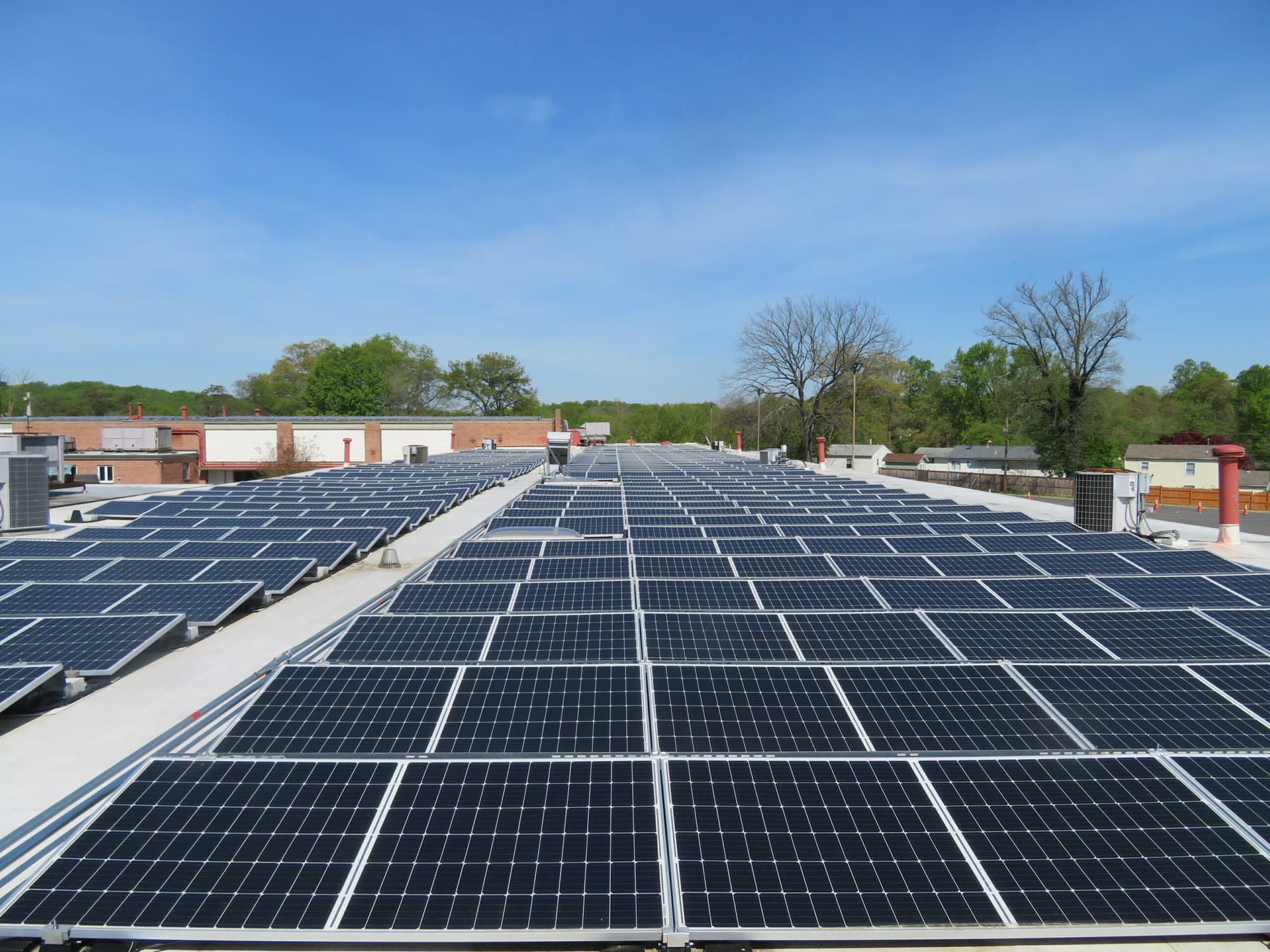Expanding Resilient Power in Maryland

The rooftop solar PV system serving the MEA-funded resiliency hub located at St. Jude Regional Catholic School in Rockville, MD. Photo courtesy of Maryland Energy Administration
The Maryland Energy Administration resilient power initiatives are helping Maryland organizations support their operations, protect communities, enhance sustainability, and achieve energy affordability. The Resilient Maryland Program provides funds to help pay for feasibility analyses, preconstruction analysis, and capital funds for the development and installation of microgrids, resilient facility power systems, and resiliency hubs for Maryland communities, businesses, critical infrastructure, and many others. The program’s Area of Interest 3, Resiliency Hubs, provides capital funds to organizations for the installation of solar PV and battery storage systems that enable them to become “resiliency hubs,” which are local, community-serving locations where residents can access power for their essential devices, to refrigerate temperature-sensitive items, and to shelter in safe and healthy temperature-conditioned spaces. This comprehensive microgrid and DER development and installation program provides funds to 1) address resource gaps in the mobilization of resilient energy systems by reducing out-of-pocket expense by adopters, and 2) to attract more private capital into the distributed energy resources (DER) market. The FY23 Resilient Maryland program consolidates several of MEA’s prior standalone resiliency programs, discussed in more detail below, into a single streamlined “one-stop” program platform.
Resilient Maryland Planning Funds
The Resilient Maryland Program was first offered as a pilot program in early 2020 to help awardees pay for the costs of conducting important initial feasibility analysis and preconstruction planning for microgrids, resilient facility power systems, and resiliency hubs. Feedback from industry, grantees, and other stakeholders over the past decade revealed that the primary point of failure for many DER projects was the inability to get through the costly early development phase, due to lack of available capital and/or the failure to meaningfully and concisely communicate the value proposition to key project stakeholders and capital providers. Following a robust response to the pilot year, in which MEA received 25 unique applications for a total funding ask of well over $1 million, there was a clearly demonstrated demand for this type of DER system support and ripe potential uptake statewide, across nearly every sector of Maryland’s economy. To date, MEA has issued 30 awards at a combined total of nearly $2.5 million to help Maryland organizations gauge feasibility and produce critical preconstruction deliverables for microgrids and other resilient energy systems. The Resilient Maryland planning program has become Area of Interest 1 under the FY23 Resilient Maryland platform.
Resilient Maryland Capital Development
MEA offered a pilot capital incentive program for microgrids and other resilient energy systems in its FY22 program portfolio, following the robust success of its Resilient Maryland planning program. This pilot was designed to provide one or more equipment and installation grants to Maryland organizations that were ready to proceed with the installation of microgrids and other DER systems. MEA issued a $750,000 Resilient Maryland Capital Development award to FY20 Resilient Maryland planning funds award winner Frostburg State University to help with the costs of installing a solar PV, fuel cell, and advanced thermal storage and management system microgrid to serve the university and protect its critical loads during power outage events. The Resilient Maryland Capital Development Pilot has become Area of Interest 2, Microgrid Capital, under the FY23 Resilient Maryland platform.
Resiliency Hubs
The Resiliency Hubs Program was first launched in 2019 to help Maryland communities engage local organizations to create “resiliency hubs” that residents could easily access in times of grid outage. MEA considers a resiliency hub to be a location within a community, such as a community center, library, or faith-based institution, that provides emergency power for charging portable electronic devices, refrigerating temperature sensitive medications, and providing safe and healthy conditioned space where residents can stay until the outage situation concludes or more robust emergency response services arrive. Resiliency hubs are situated at locations well known and trusted by surrounding community members, where community leadership can best understand and balance the residents’ unique needs with the resources that the resiliency hub can provide. The Resiliency Hubs program has become Area of Interest 3 under the FY23 Resilient Maryland platform.
Funding the Just Transition
The Resilient Maryland program specifically favors DER projects that prioritize bringing resiliency benefits to Marylanders who experience socioeconomic vulnerabilities and challenges, as well as disproportionate detrimental impacts from power outages. The program drives DER system investment into these communities to bolster the resilience and sustainability of businesses, organizations, core government services, critical infrastructure, and housing that these Marylanders depend on. Benefits include but are not limited to the preparation of actionable plans for systems, microgrid and resilient energy system equipment and installation capital funds, as well as the creation of easily accessible locations for community residents to safely congregate during grid outage situations and access electricity for essential devices.
For example, both the Resilient Maryland and Resiliency Hubs programs have enabled city of Baltimore to move forward on its plan to create a network of resiliency hubs across the city’s most vulnerable and underserved communities. This network, by virtue of its design, places communities in leadership roles for their hubs and allows for the sharing of resources between hubs. The Resilient Maryland program awarded a comprehensive $300,000 award to clean energy nonprofit Groundswell, Inc., which allowed it to gauge feasibility and complete preliminary solar PV and battery storage system designs for 26 prospective hub sites across the city, in its partnership with the Baltimore City government. Examples of common locations include faith-based institutions and community centers, namely due to the community-wide trust they have established with residents.
Resilient Maryland and Resiliency Hubs have provided over 21,000 hours of employment in energy sector jobs since their inception—these include but are not limited to analysis, engineering, financial modeling, and installation, as well as student internships and other workforce development opportunities.
Benefits and Impacts
Both programs continue to be incredibly well received across the state. The Resilient Maryland Program has awarded 30 grants at nearly $2.5 million combined. The Resiliency Hubs Program has provided seven grants totaling over $2 million combined. The grants fund equipment and installation services for the solar PV, battery energy storage, and associated racking, mounting, and wiring necessary to equip community facing facilities with the resilient energy infrastructure to become resiliency hubs for their communities.
A key success driver is the flexibility in the program in allowing applicants to propose project locations, energy system configurations to explore and install, and to provide a detailed justification for their choices. This differs from the prescriptive approach in which programs detail what systems can be installed, and instead trusts the organization to know its needs and articulate why the configuration(s) it pursues will help meet its goals.
A Model for Other States
The Resilient Maryland Program can be replicated by other states/jurisdictions, and its Areas of Interest can also be run as standalone programs like their MEA predecessors. Their formats are simple and employ evaluation criteria that should easily mesh with other requirements, such as those that come with various funding sources and statutory/regulatory objectives.
In 2022, the Maryland Energy Administration was awarded a State Leadership in Clean Energy Award for the Resilient Maryland / Resiliency Hubs Grant Program by the Clean Energy States Alliance (CESA). According to an independent panel of judges, “Maryland Energy Administration’s suite of resiliency programs are well designed, with holistic project evaluation criteria and ample opportunity for community input on system configuration. These programs will help support low-income and medically vulnerable communities by providing access to solar and battery storage systems during outages.” For a detailed case study on MEA’s resilience programs, and the five other winners of the 2022 State Leadership in Clean Energy Awards, see a new report released by CESA in September 2022.
Representatives from MEA will discuss their resilience programs in a CESA webinar on December 9 – learn more.

